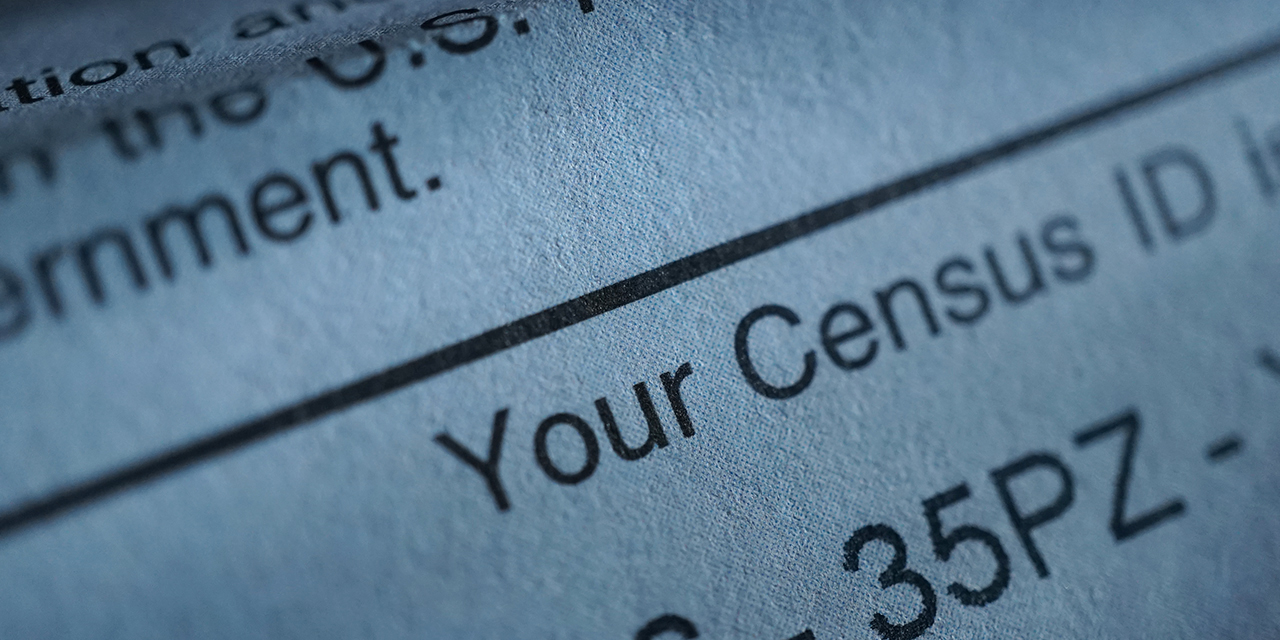
We conducted this study to better understand Americans’ attitudes about the census and whether they plan to participate. We compared these findings with those of a survey conducted in January 2020 to see how attitudes changed as the census approached.
For this report, we surveyed 3,456 U.S. adults in February and March 2020. The adults surveyed are members of Ipsos Public Affairs’ KnowledgePanel, an online survey panel that is recruited through national, random sampling of residential addresses and landline and cellphone numbers. KnowledgePanel provides internet access for those who do not have it and, if needed, a device to access the internet when they join the panel. To ensure that the results of this survey reflect a balanced cross section of the nation, the data are weighted to match the U.S. adult population by gender, age, education, race and ethnicity and other categories. The survey was conducted in English and Spanish.
For more information on how we conducted this study, see the methodology section.
References to whites and blacks include only those who are non-Hispanic and identify as only one race. Hispanics are of any race.
All references to party affiliation include those who lean toward that party. Republicans include those who identify as Republicans and independents who say they lean toward the Republican Party. Democrats include those who identify as Democrats and independents who say they lean toward the Democratic Party.
References to college graduates or people with a college degree comprise those with a bachelor’s degree or more. “Some college” includes those with an associate degree and those who attended college but did not obtain a degree.
Foreign born refers to people born outside of the United States, Puerto Rico or other U.S. territories to parents neither of whom was a U.S. citizen, regardless of legal status.
U.S. born refers to individuals who are U.S. citizens at birth, including people born in the United States, Puerto Rico or other U.S. territories, as well as those born elsewhere to parents who were U.S. citizens.
 Amid a blitz of advertising about the 2020 census, a rising share of U.S. adults have heard something recently about it: Two-thirds say so in a new Pew Research Center survey, up from half a few weeks earlier.
Amid a blitz of advertising about the 2020 census, a rising share of U.S. adults have heard something recently about it: Two-thirds say so in a new Pew Research Center survey, up from half a few weeks earlier.
Overall readiness to respond to the census has inched up since earlier this year, even as some key hard-to-count groups remain less enthusiastic than others.
Notably, in an era where opinions on a host of national issues fall along political lines, perceptions about the U.S. census largely are not polarized, according to the new survey. Republicans and Democrats (including those who lean toward each party) are about equally likely to say they plan to respond. Similar majorities of Democrats and Republicans also say they believe census results will not benefit one party more than the other, and majorities of both say the 2020 census will at least be somewhat successful in accurately counting the number of people living in the U.S.
The new survey of 3,456 U.S. adults was conducted online Feb. 25-March 9, 2020, just before 2020 census letters began arriving in most people’s mailboxes.
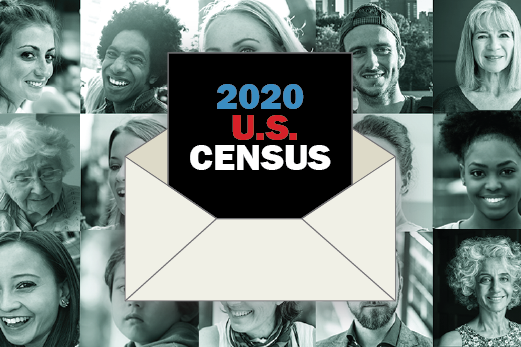
Try our email course on the U.S. census
Learn about why and how the U.S. census is conducted through five short lessons delivered to your inbox every other day.
Sign up now!
Eight-in-ten U.S. adults say they definitely or probably will participate in the census, similar to the 78% who said so in a Pew Research Center survey fielded Jan. 3-13, 2020. The share who are most enthusiastic – who say they definitely will respond to the census – rose somewhat to 59% in the new survey, compared with 55% in January. The total saying someone else in their household probably or definitely would respond did not change, for a total of 83% who say they or someone in their household probably or definitely would participate.
Higher share of older adults than younger ones have heard something recently about the census
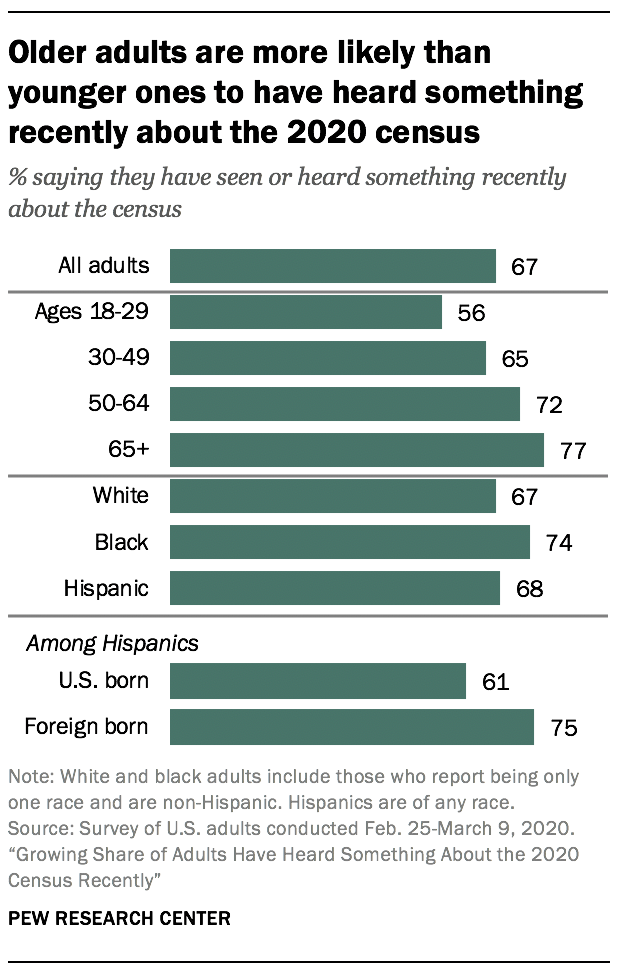 Black adults are more likely than white adults to say they have heard something recently about the 2020 census. That also is true of foreign-born Hispanics compared with U.S.-born Hispanics. Older adults are more likely than younger ones to have heard about the census recently, as are adults who are college graduates (73%) compared with those who do not have a four-year college degree (65%).
Black adults are more likely than white adults to say they have heard something recently about the 2020 census. That also is true of foreign-born Hispanics compared with U.S.-born Hispanics. Older adults are more likely than younger ones to have heard about the census recently, as are adults who are college graduates (73%) compared with those who do not have a four-year college degree (65%).
Most who heard something recently saw news stories or ads
Information about the census is reaching people through multiple channels, with news and advertising prominent among them. Of those who have heard something recently about the census, 70% say some of that information came from advertising and 61% say it came from news stories. About a quarter (26%) heard about the census via social media posts from people they know.
Among those who have heard or seen something recently, 42% cite the government as a source of their information, and 30% say friends or family members were a source. Relatively few (16%) heard about the census from community or religious groups.
Latinos are more likely than white or black adults (among those who heard something recently) to say the information came from an ad (79% vs. 69% for white adults and 70% for black adults), news story (70% vs. 60% and 54%) or social media posting (39% vs. 29% and 21%). Of those who saw or heard something recently about the census, foreign-born Latinos are more likely than those born in the U.S. to have seen a news story (78% vs. 61%) or social media post (47% vs. 30%). These differences may reflect in part the Census Bureau’s outreach campaign aimed at hard-to-count groups, which include Spanish-speaking Latino immigrants.
Among those who saw something recently, a higher share of Hispanics than whites point to local, state or federal government as a source of information about the 2020 census. Both Hispanic and black adults are more likely than white adults to have seen or heard something recently from friends or family, or from community or religious groups.
Among those who saw or heard something recently, college graduates are more likely than those without a four-year degree to have recently seen or heard a news story about the census, while those with some college or less education are more likely to have recently seen or heard an ad (and slightly more likely to have seen a social media post). Social media also is a more common source of recent census information for younger adults than for older ones, reaching 30% of those ages 18 to 49 compared with 22% of those ages 50 and older.
More have heard positive than negative information about the 2020 census
Among those who have heard something recently about the census, a slight majority say the information was mostly positive (53%); only 4% say the information was mostly negative. Another 16% say they’ve heard a mix of both positive and negative information, and 28% say it was neither positive nor negative.
For about six-in-ten black (61%) or Hispanic adults (60%) who have heard something recently about the census, the messages were mostly positive; for white adults, about half say so. Foreign-born Hispanics are more likely than U.S.-born Hispanics (71% vs. 48%) to have heard positive reports about the census. A higher share of older adults (ages 65 and older) compared with the young (those ages 18 to 29) say the information they have heard or seen has been mostly positive (59% vs. 45%), among those who have seen or heard something about the census recently.
Somewhat positive perceptions of census accuracy; most say they’d prefer to participate online
The new survey finds that most U.S. adults have neutral or positive attitudes about the results, impact, safety and other features of the 2020 census. These views are little changed since our January survey.
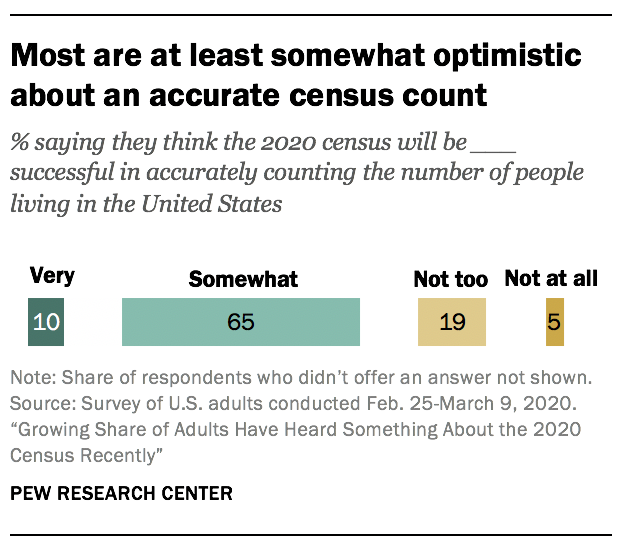 Three-quarters of U.S. adults say the 2020 census will be at least somewhat successful in producing an accurate count of the total population, though only 10% say it will be very successful. When asked about the cost of the census, half (51%) say they are not sure whether it will cost too much money, 27% say it will not cost too much and 20% say it will. Only a small share of the public thinks the census will benefit one political party more than another. Most say it will benefit neither party (58%) or they are not sure (27%).
Three-quarters of U.S. adults say the 2020 census will be at least somewhat successful in producing an accurate count of the total population, though only 10% say it will be very successful. When asked about the cost of the census, half (51%) say they are not sure whether it will cost too much money, 27% say it will not cost too much and 20% say it will. Only a small share of the public thinks the census will benefit one political party more than another. Most say it will benefit neither party (58%) or they are not sure (27%).
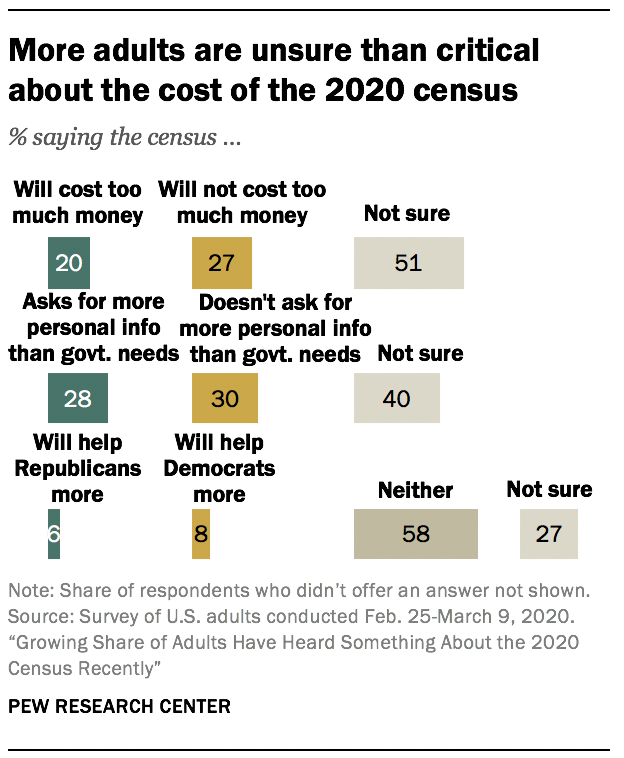 On the question of whether the census asks for too much personal information, a plurality (40%) are not sure, with the remaining answers split between yes (28%) and no (30%). A majority of adults (57%) say they have at least a fair amount of confidence the government will keep their personal data safe, though only 12% say they have a great deal of confidence. In the Center’s January survey, respondents had about the same amount of confidence in the Census Bureau as in their credit card companies to keep their personal data safe, but more confidence than in companies they do business with or social media sites.
On the question of whether the census asks for too much personal information, a plurality (40%) are not sure, with the remaining answers split between yes (28%) and no (30%). A majority of adults (57%) say they have at least a fair amount of confidence the government will keep their personal data safe, though only 12% say they have a great deal of confidence. In the Center’s January survey, respondents had about the same amount of confidence in the Census Bureau as in their credit card companies to keep their personal data safe, but more confidence than in companies they do business with or social media sites.
Although most adults don’t know that an online option is available to respond to the census, that’s the response mode that most (61%) say they would prefer, according to the new survey as well as the January survey. (The Census Bureau also hopes most people will take the census online.) The rest prefer to answer by mail (29%), phone (1%) or an in-person interview (7%, although the survey was taken before the widespread impact of the COVID-19 outbreak).
As in January, people who preferred another response mode to answering online are most likely to say a major reason is that online data may not be secure (42%) or that they just prefer a different way to participate (also 42%). Smaller shares say a major reason is that answering online is less convenient (11%) or they don’t have reliable internet access (9%).
Gaps in knowledge about the census persist
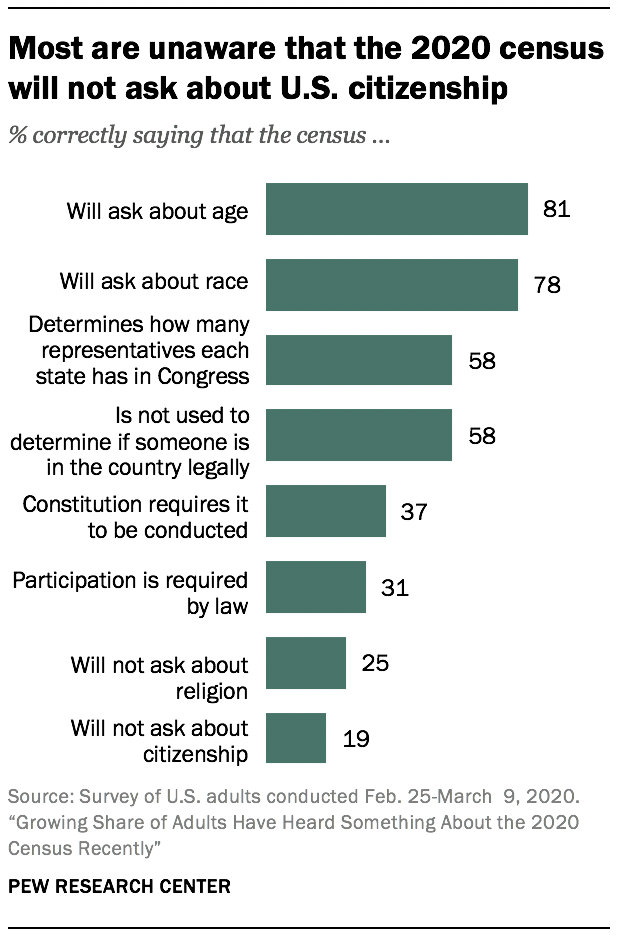 A large majority of U.S. adults either erroneously think the 2020 census will ask if they are a citizen or not (53%) or are unsure if this will be on the census form (27%). But the small share correctly saying that citizenship will not be on the 2020 form has ticked up slightly since the survey conducted in January of this year. At that time, 17% said the census will not ask about citizenship; in the new survey, 19% said the same. Party differences on this item persist, with Republicans significantly more likely than Democrats to say the census will include a citizenship question.
A large majority of U.S. adults either erroneously think the 2020 census will ask if they are a citizen or not (53%) or are unsure if this will be on the census form (27%). But the small share correctly saying that citizenship will not be on the 2020 form has ticked up slightly since the survey conducted in January of this year. At that time, 17% said the census will not ask about citizenship; in the new survey, 19% said the same. Party differences on this item persist, with Republicans significantly more likely than Democrats to say the census will include a citizenship question.
The small uptick in correct answers about the citizenship question was accompanied by a rise in the share correctly saying that the census is not used to determine if someone is in the country legally. In January, 53% said this, and in the new survey this share had risen somewhat to 58%.
As in January, the public is generally well-informed about some of the basic questions that will be on the census form and how data will be used. About eight-in-ten adults know that the form will ask about age (81%) and race (78%), and roughly six-in-ten (58%) correctly say that the census determines congressional representation.
Smaller shares know that the U.S. Constitution mandates that the census is conducted (37%), that participation is required by law (31%), or that the form will not ask about religion (25%).
Older adults and those with more education demonstrate more knowledge about the census in general, following the same pattern as in the January survey. For example, 33% of those 65 and older are in the “high” knowledge category (those who correctly answered at least six of the eight items asked about), compared with only 14% of those ages 18 to 29.
These gaps are found on each of the knowledge questions. For example, 51% of those with a bachelor’s degree or more education correctly say the Constitution requires that the census be conducted, while 31% of those with some college education or less say the same.
Intent to participate in the census changed little since January
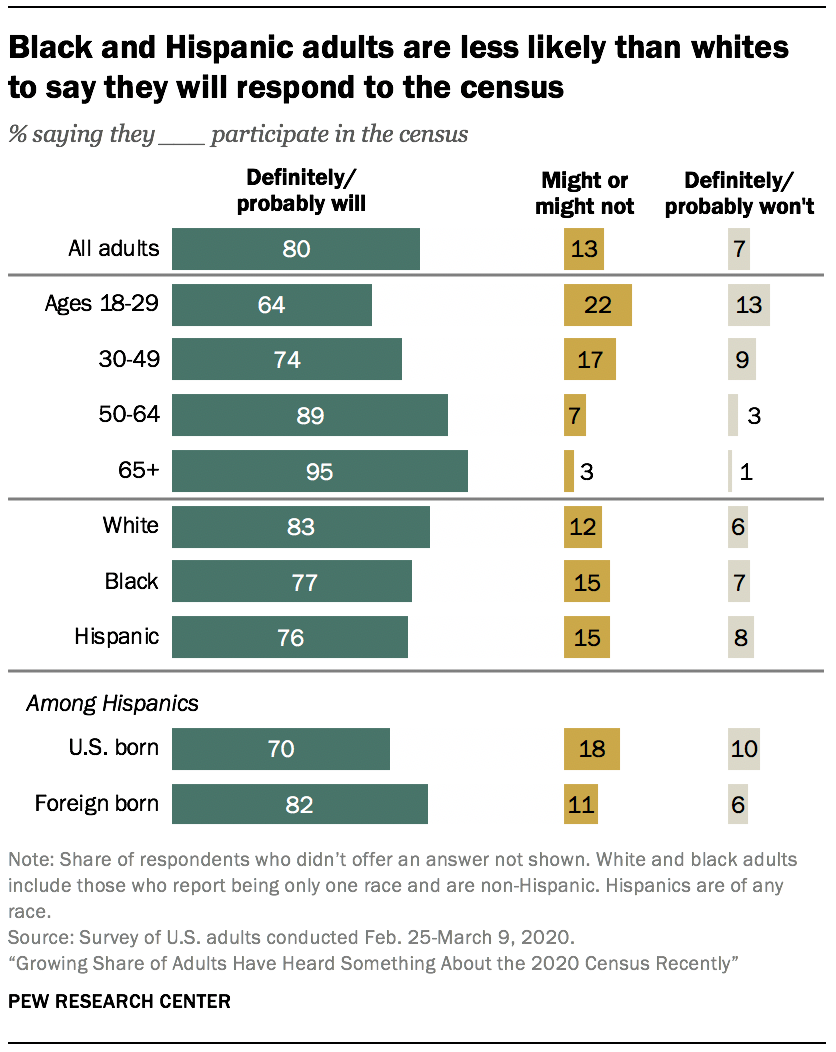 As was the case in January, the new survey finds some key groups that are considered hard to count are less inclined to respond to the census than others. People who are black or Hispanic are less likely than those who are white to say they probably or definitely will respond. Similarly, adults younger than 30, many of whom would be filling out their own census form for the first time, are less likely than those in older age groups to say they probably or definitely will participate.
As was the case in January, the new survey finds some key groups that are considered hard to count are less inclined to respond to the census than others. People who are black or Hispanic are less likely than those who are white to say they probably or definitely will respond. Similarly, adults younger than 30, many of whom would be filling out their own census form for the first time, are less likely than those in older age groups to say they probably or definitely will participate.
The share of adults ages 50 to 64 and ages 65 and older who are ready to participate did rise since the January survey.
Knowledge of and perceptions about the census are strongly correlated with intent to participate. However, it is important to note that our survey was not designed to discover whether a specific belief or perception directly affects intention to participate or is simply associated with awareness or other attitudes.
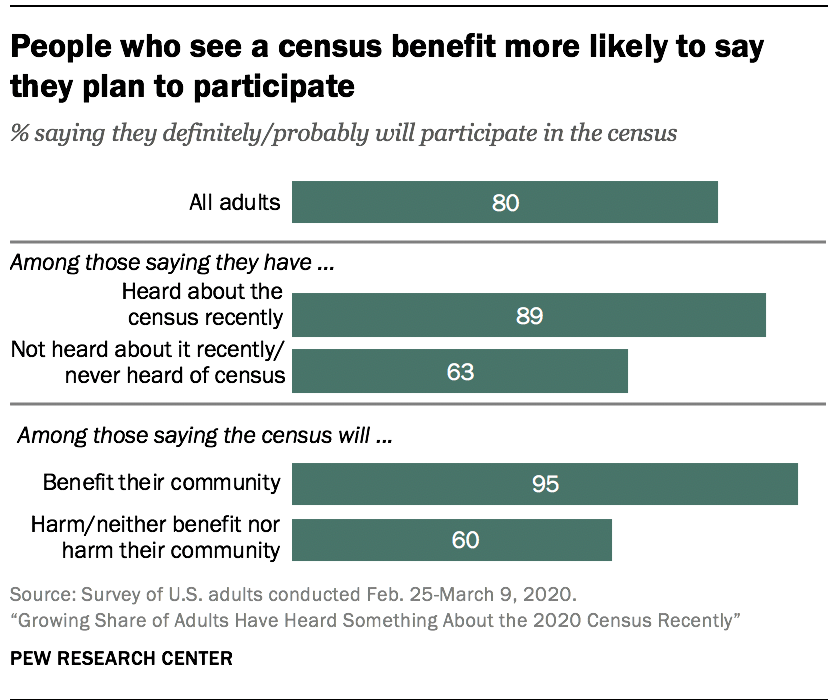 Among the links to participation are those who have heard or seen something recently about the census being more likely to say they will probably or definitely respond (89%) compared with those who have not heard something recently (63%).
Among the links to participation are those who have heard or seen something recently about the census being more likely to say they will probably or definitely respond (89%) compared with those who have not heard something recently (63%).
Among all adults, 59% say they believe that participating in the census will benefit their communities. And those adults are disproportionately likely to say they definitely or probably will participate – 95% say so.
Only 29% of adults say that filling out the census form will have a personal benefit for them. About seven-in-ten (69%) say that census participation will neither benefit nor harm them, and only a small share (2%) say it will harm them. Among those who see a personal benefit, 96% say they probably or definitely will participate in the census.
In addition, those who think the 2020 census is likely to be accurate (86%) are more likely to say they plan to participate than those who are not persuaded it will be an accurate count (65%).
People who have at least a fair amount of confidence the census will keep their data safe are more likely than those who are not confident to say they definitely or probably will file their census form (89% vs. 70%).
Still, even among people who say the census asks for too much personal information, 77% say they definitely or probably will submit their information, compared with 95% of people who say the census does not ask for too much.
Those hesitant to participate cite lack of trust
Those who say they may not, definitely won’t or probably won’t participate cite similar reasons as they did in the January survey. About a third say a major reason is that they don’t trust the government to use the information properly (34%) or that they think the census asks for too much personal information (31%).
About a quarter (26%) say a major reason they may not or won’t participate is that they don’t know enough about the census. And 13% say a major reason is submitting a census form will take too much time. These findings are similar to our January survey about participation in the 2020 census.
Bipartisan intention to participate in the census
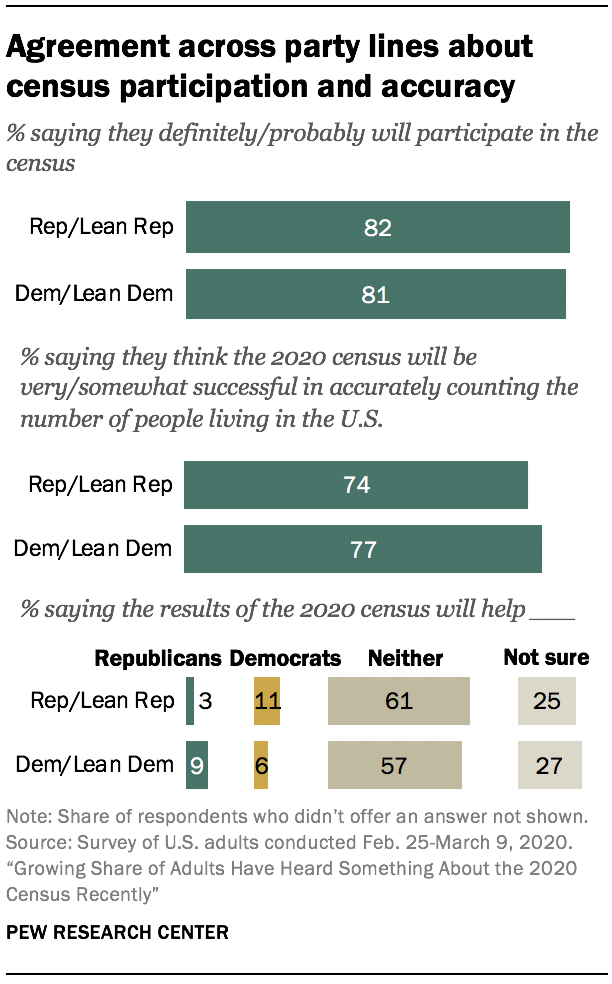 Democrats and Republicans, including independents who lean to each party, are about equally likely to say they probably or definitely will participate in the census. They have similar views about the accuracy of the census, and they do not on the whole believe census results will help one party more than the other.
Democrats and Republicans, including independents who lean to each party, are about equally likely to say they probably or definitely will participate in the census. They have similar views about the accuracy of the census, and they do not on the whole believe census results will help one party more than the other.
Nearly all Democrats (95%) and Republicans (96%) have heard of the census. Democrats (70%) are modestly more likely than Republicans (65%) to have heard or seen something recently, but most in both parties have done so.
Democrats (81%) and Republicans (82%) are equally likely to say they probably or definitely will participate. They also are equally likely to say they might or might not participate (12% and 13% respectively), and similar shares say they probably or definitely won’t participate (7% and 5%). Among partisans on each side who may not participate, their major reasons are similar: a distrust of how the government will use the information they collect or that the census asks for too much information.
Partisans on both sides are about equally likely to say the census has at least a somewhat successful chance of accurately counting the number of people living in the U.S. A total of 77% of Democrats and 74% of Republicans say so, a difference that is not statistically significant.
Majorities of both parties say the census will help neither party in particular (61% of Republicans say so compared with 57% of Democrats). About a quarter of each are not sure. Only 9% of Democrats say it will help Republicans more, and only 11% of Republicans say it will help Democrats more.
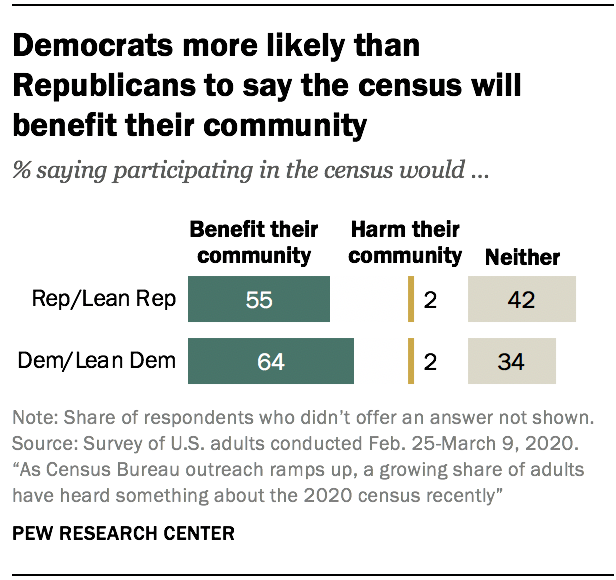 There is no party difference on whether the census asks for too much personal information. On the issue of privacy and confidentiality, Republicans are only modestly more persuaded than Democrats that the census will keep their data safe – 61% compared with 55% say they have a fair amount or a great deal of confidence in that.
There is no party difference on whether the census asks for too much personal information. On the issue of privacy and confidentiality, Republicans are only modestly more persuaded than Democrats that the census will keep their data safe – 61% compared with 55% say they have a fair amount or a great deal of confidence in that.
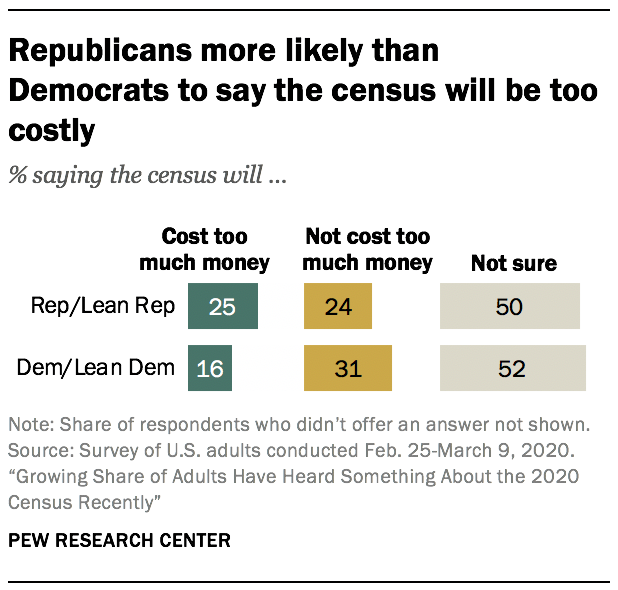 A majority of both Democrats and Republicans say that filling out the census will benefit their community, though Democrats (64%) are more likely than Republicans (55%) to say so. Although less than half of each group say that census participation will benefit them personally, Democrats are more likely than Republicans to say so (33% to 24%).
A majority of both Democrats and Republicans say that filling out the census will benefit their community, though Democrats (64%) are more likely than Republicans (55%) to say so. Although less than half of each group say that census participation will benefit them personally, Democrats are more likely than Republicans to say so (33% to 24%).
A higher share of Republicans than Democrats say the census will cost too much money (25% vs. 16%). Meanwhile, a higher share of Democrats than Republicans say it will not cost too much (31% vs. 24%). About equal pluralities among both parties are not sure – 50% among Republicans and 52% among Democrats.
CORRECTION (March 30, 2020): A previous version of this report incorrectly stated that U.S.-born Hispanics are more likely than foreign-born Hispanics to say they have heard something recently about the 2020 census. In fact, foreign-born Hispanics are more likely to say this. The text has been corrected.


 Learn about the U.S. census in our email mini-course
Learn about the U.S. census in our email mini-course